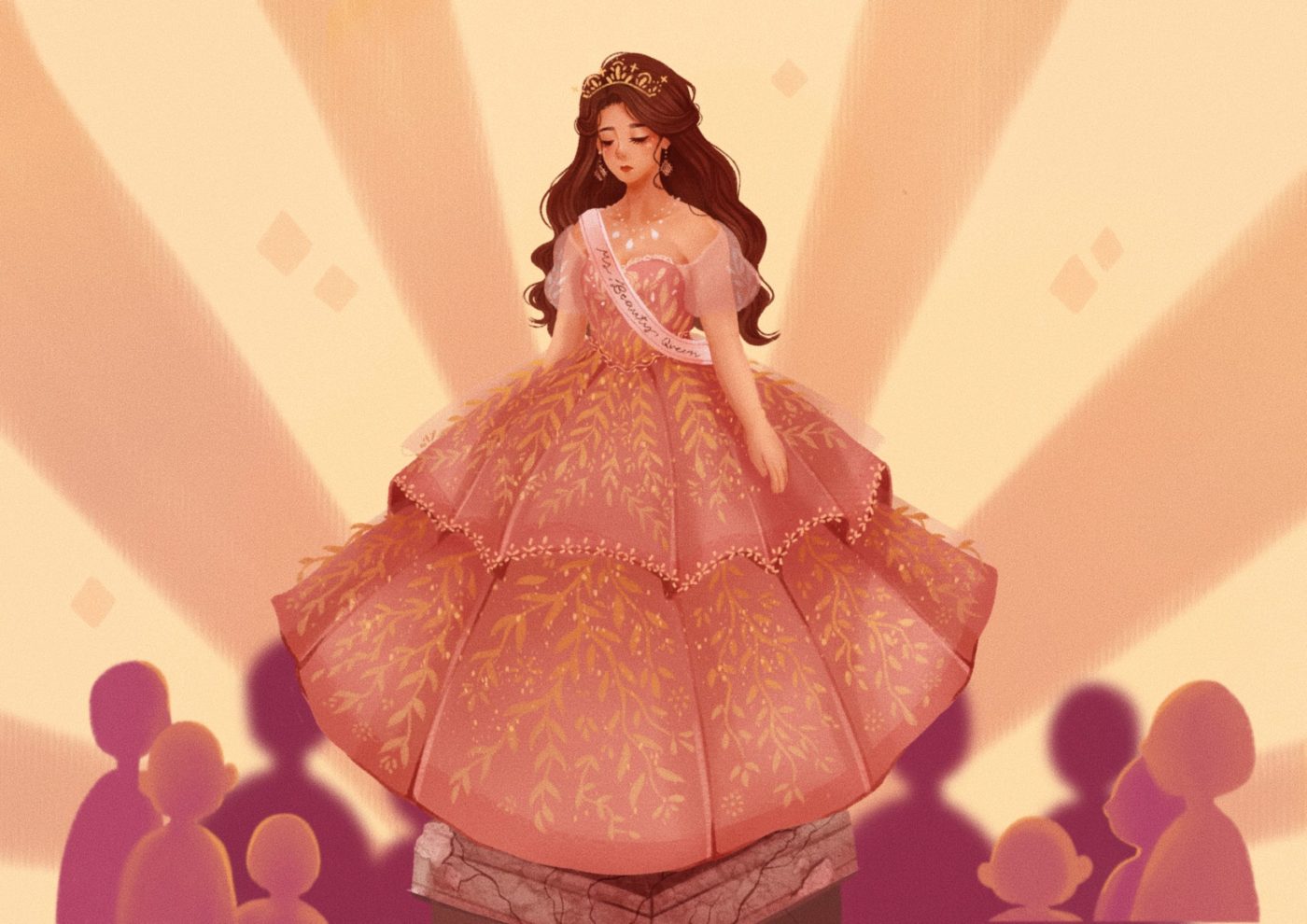WITH PAGEANT season just around the corner, murmurs of people gathered to place bets on candidates they picture worthy of the title grow louder into distant cheers of the crowd. All eyes and ears are attuned to one stage filled with women who exude beauty, grace, and eloquence.
This obsession with pageantry is deeply ingrained in our culture, with Filipinos avidly searching for contestants who could bring home the next crown. The accolades beauty queens obtain are celebrated by people from all walks of life—however, behind these triumphs are stories devoid of the glitz and glamor we have grown accustomed to. Beneath the sash that holds a beauty queen’s title is a chain that binds her to a grueling undertaking.
Crowd favorite
Images of tall women with slender builds usually come to mind when a Filipino thinks of beauty queens. Fueled by the desire to strut on the same platform, contestants attempt to fit themselves into these standards for a greater chance at winning. “These pageants originated from the West, so the [standard of beauty] is consistent with how the organizers [construct] what beautiful means,” Communication Department Assistant Professor Anjo Lorenzana explains.
This ideal representation of beauty dates back to the Spanish colonization and the introduction of Flores de Mayo, where the Reyna Elena is crowned as most beautiful. This notion of beauty perpetuated until the American colonization, where the Manila Carnival was established and a Carnival Queen would be crowned to attract foreign tourists with her beauty. Eventually, the emergence of televised American media cemented beauty pageants into Filipino culture for good. These pageants mainly revolved around physical beauty.
However, this standard changed when advocacies were added to the criteria, thus allowing contestants to engage in socio-political discourse. “These advocacies are [new]. It’s now the beauty contestant who brings her advocacy to the pageant. That is an interesting development,” Lorenzana shares.
With the vast reach of beauty pageants, these have easily become a potential avenue to advocate for change. This opportunity inspired Nicole Villasper, a second year AB History student from the University of Santo Tomas and winner of Miss U-Belt 2020, to join pageants.
Having been an active participant in organizations that focus on social studies, Villasper sought for a platform where she could speak about issues that plague the Filipino community. “I never saw myself fitting the [conventional] beauty standards, but I felt like I had something to say. I’m very passionate about [stating] my opinions about social issues,” she explains.
What was once a mere celebration of beauty has now become a platform that can amplify diverse voices, as present-day candidates join pageants to serve as catalysts for social change. In pursuit of their ambitions and advocacies, contestants embark on a long and difficult journey to fulfill their beauty queen dreams.
The sash that shackles
Behind the spectacle showcased on-stage are months of stringent preparation. “I had to start my day from 7 am until 2 am for the Pasarela training, for the Q&A, for gown fittings, [and personality development training], so it was a very rigorous training,” Villasper details. “It was really hard because I was so burned out.”
All efforts amount to their two-hour performance on stage. According to her, the actual competition was a nerve-wracking experience as they had no inkling of their destiny. “In beauty pageants, it’s really like a gamble. You can’t really say if you’re gonna win or not, so you just really have to give your all, ” she explains.
This determination resulted in her winning Miss U-Belt 2020 and receiving admiration from her community. “More people believed in my potential and what I [could] do,” she says.
While her victory amassed recognition, unrealistic pressure had been impressed upon her. “There are times [when] people would [tell me to act a certain way because I joined beauty pageants], but there are times [when] I don’t want to look good,” she recounts. Despite this, she learned to filter the criticism thrown her way.“If I feel like that comment comes from someone who doesn’t know me personally, then I don’t take it personally as well.”
Amid hurdles, candidates also go beyond measure to fulfill their dreams of becoming a beauty queen. In the case of Katherine Guevarra, a second year BS Accountancy student from Jose Rizal University, she refused to let her financial instability impede her journey of competing in Mr. and Ms. JRU 2020. While she garnered the support of her peers, classmates, and professors, her parents had discouraged her from joining the pageant because of monetary constraints. This tainted her relationship with them. “I asked my auntie and then umiyak talaga ako sa kanya. Nagpa-help ako [sa kanya] na sabihin [kina] papa and mama na gustong-gusto ko talaga yung pageant na ‘yun (I asked my aunt and I cried to her. I asked her to help me tell my papa and mama that I really wanted that pageant),” she divulges.
Due to these circumstances, she endeavored to save up for the competition. “Nag-ipon ako ng money through my savings, and also, nag-online selling din ako (I saved money through my savings and I also ventured into online selling),” she shares. The strides she took paid off when she won the titles Best in Advocacy and People’s Choice.
Although these preparations and struggles play a massive role in the competition, they easily go unrecognized by the public. Villasper says that women do not endure the painstaking process of competing in pageants for superficial reasons.
“These girls do not just join pageants for the sake of it, because they want to look pretty. [They] join pageants because of the opportunities [these] give. It allows women to have a voice that is not only heard but is actually listened to and valued,” she explains.
Despite this, misconceptions on the focus and intentions of beauty pageants and their contestants prevail among Filipinos.
Double-edged crown
The purpose of beauty pageants is often misconstrued due to their commodification of beauty. Since the pageant industry economically thrives on this, people tend to fixate on women’s beauty in lieu of the work that contestants pour into competitions. “You have the talent scouts and then you have the fashion designers, and you definitely have media and advertising. Media companies actually give space for it because it is a revenue-generating content,” Lorenzana explains.
This cultivates a culture obsessed with physical appearances. Villasper notes that people continue to eye candidates who conform to a certain standard of beauty. “Pageants now [are] no longer focused on the physical aspects only, but it’s still a determining factor. And so before, I’ve experienced screening for pageants and being told that, ‘You’re a great candidate but can you lose a little more weight?’” she recounts.
In light of this beauty-obsessed culture, she urges people to refrain from making insensitive comments about candidates’ physical attributes. “I’ve known girls who had their own share of criticisms that aren’t always constructive,” Villasper says. “We must remember that these girls are also humans, and that [hateful comments] affect their confidence.”
In spite of the manner by which the media zeroes in on beauty queens’ appearances in lieu of their arduous journeys, society must look beyond their ostentatious facade and read deeper into the causes they fight for.







